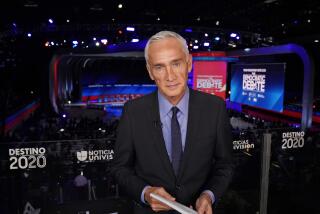Univision Reports 68% Rise in Profit
- Share via
Univision Communications Inc., owner of the nation’s biggest Spanish-language TV network, said Thursday that first-quarter earnings jumped 68% as more viewers tuned in to its news and entertainment shows.
Net income rose to $12.8 million, or 5 cents a share, from $7.6 million, or 3 cents, a year earlier, Univision said. Revenue increased 22% to $261.7 million.
Los Angeles-based Univision said the number of viewers aged 18 to 49 rose in February to its highest level of any month, boosted by popular programs such as the morning show “Despierta America.” Audience ratings for the news show “Noticiero Univision” rose 12% among younger viewers after March 20, when the war in Iraq began.
“Their ratings continue to be very strong,” said David Joyce, an analyst with Guzman & Co. who rates the shares “outperform” and doesn’t own them. “They have consistent programming that continues to be very popular.”
Shares of Univision rose as much as $1.85 to $31 in extended trading, after the company reported earnings. Earlier, they fell $1.60 to $29.15 on the New York Stock Exchange. They’ve increased 19% this year.
The company forecast second-quarter earnings of 13 to 14 cents a share, up from 9 cents a year earlier. Revenue will be little changed, with this year’s sales growth from regular programming offset by the lack of $65.6 million in revenue from last year’s World Cup soccer tournament, the company said. Univision is expected to earn 14 cents a share, the average estimate of analysts surveyed by Thomson First Call.
Revenue from the company’s television business rose 11% in the first quarter from a year earlier. The war in Iraq reduced the growth by about $3 million as advertisers purchased less time for commercials. Univision was hurt less than other broadcasters, said Ron Furman, executive vice president for network sales.
“I don’t think we saw the change in momentum around the war that other people saw,” he said. “The week or so around the war was kind of a vacation for media buyers. They didn’t buy anything, but they didn’t cancel either.”
More to Read
The biggest entertainment stories
Get our big stories about Hollywood, film, television, music, arts, culture and more right in your inbox as soon as they publish.
You may occasionally receive promotional content from the Los Angeles Times.










